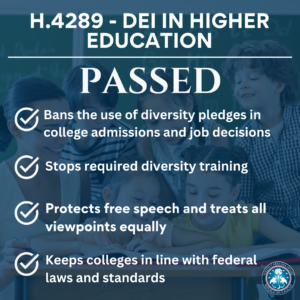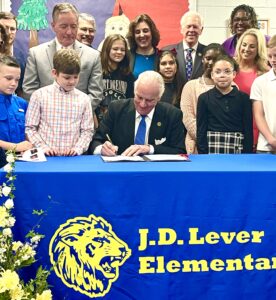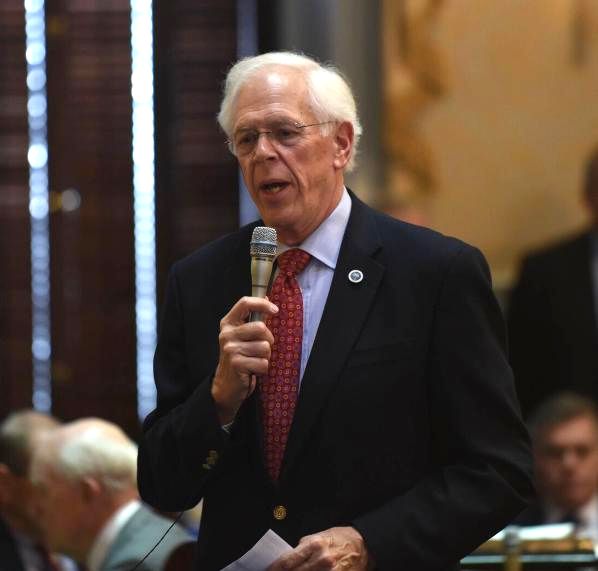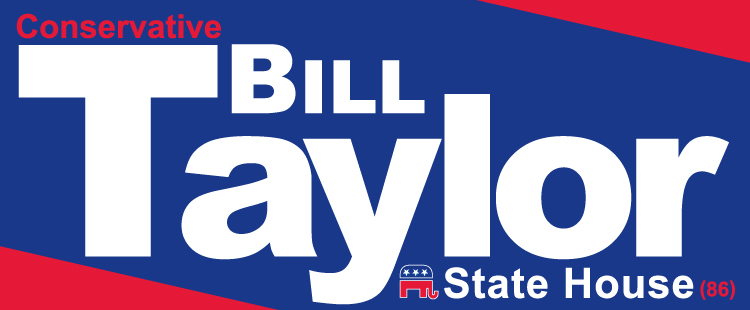Dear Friends:
Let’s start with a flashback. Your Christmas in 2022 nearly went dark after several days of freezing temperatures, which drove demand for electricity to record highs because South Carolina didn’t have enough power to meet demand. While some areas were forced to experience rolling blackouts, Aiken and surrounding counties were lucky to avoid the calamity that is more common in California.
Keeping Your Lights On
Threats to reliable electricity are unacceptable. The failure to build the V.C. Summer nuclear expansion project left us further behind. Electricity demand is soaring because of our rapid population growth and expanding industry. The lights must stay on, as well as our heat and air conditioning, and power to hospitals, schools, industries, and businesses. Electricity is essential to our lives.
For the past 18 months, the House of Representatives has been laser-focused on ensuring SC has the needed power for the foreseeable future.
The 10-Year Plan
 This week, the House’s final vote of 83-21 saw passage of the ‘South Carolina Energy Security Act,’ which aims to tackle the state’s growing energy needs due to its expanding economy and population. This comprehensive bill (H.5118) employs an “all of the above” approach to energy generation, incorporating several key measures:
This week, the House’s final vote of 83-21 saw passage of the ‘South Carolina Energy Security Act,’ which aims to tackle the state’s growing energy needs due to its expanding economy and population. This comprehensive bill (H.5118) employs an “all of the above” approach to energy generation, incorporating several key measures:
New Gas Generation: It green lights Santee Cooper to partner with Dominion Energy to develop new gas generation facilities at a retired coal site, aiming to meet future energy demands while fostering economic growth.
Public Service Commission (PSC) Restructuring: The bill proposes reducing the number of PSC commissioners from seven to three and making their positions at large to improve the quality of regulatory oversight.
Energy Policy and Infrastructure Enhancements: It encourages the exploration of nuclear power, streamlines energy infrastructure permitting, and aims for a more efficient public utility regulatory process. Additionally, it mandates the development of a strategic plan for advanced nuclear generation and supports the creation of hydrogen-capable natural gas plants.
Energy Efficiency and Clean Energy: The legislation emphasizes expanding energy efficiency programs, demand-side management, and clean energy access. It encourages utilities to invest in energy efficiency and innovative programs leveraging distributed energy resources (DER) to benefit customers and the grid.
Economic Development and Consumer Benefits: The bill enables special rates for specific economic development projects and expands options for clean energy investments to attract and retain businesses.
Institutional Support: It establishes an Energy Policy Research and Economic Development Institute and directs the Office of Regulatory Staff (ORS) to develop a ten-year energy action plan. This plan will focus on ensuring a reliable power supply and addressing challenges in the energy sector to support economic development.
Building and strengthening our electrical power will take time, so we must start NOW. The South Carolina Energy Security Act will transform energy over the next decade by modernizing our energy infrastructure. That will promote economic growth and ensure a reliable and sustainable energy supply for South Carolina’s growing population while prioritizing environmental considerations and energy efficiency. Having passed the House, the bill was sent to the Senate for consideration.
The Aiken County Connection
A long overdue policy change was approved unanimously during the energy bill debate. I teamed with Rep. Justin Bamburg to successfully amend the bill to enable the PSC to establish safety, maintenance, and inspection standards for public utility poles. This is a significant step towards addressing utility maintenance gaps in parts of our state, mainly rural areas and small towns.
Last August’s tragedy in Wagener, here in Aiken County, prompted this amendment. Wagener-Salley High School teacher Jeunelle Robinson died when a truck struck sagging power lines as she was walking back to school after eating lunch downtown. This should have never happened, and this amendment will make our old utility poles and sagging power lines safer. The amendment empowers the PSC to levy fines against utilities for violating the safety regulations once created.
Banning DEI in Higher Ed
 Diversity, equity, and inclusion (DEI) have become hot topics in higher education and are spreading to big businesses and industries. This week, the House voted to bar SC’s public colleges and universities from deploying DEI principles in their hiring and admissions practices.
Diversity, equity, and inclusion (DEI) have become hot topics in higher education and are spreading to big businesses and industries. This week, the House voted to bar SC’s public colleges and universities from deploying DEI principles in their hiring and admissions practices.
The bill’s goal (H.4289) is to ensure that everyone can be treated equally, regardless of their background or their beliefs, and it prohibits preferential treatment based on a group identity.
- It eliminates one’s race, sex, and national origin from consideration in university policies.
- It prohibits requiring a diversity statement for student admission, as well as prohibits faculty and employee diversity statements when the institution is considering whether to hire or promote someone.
- It prohibits mandatory diversity training for faculty and employees at an institution.
- It requires schools to internally audit their so-called DEI policies and report back to the Legislature each year.
I cosponsored this legislation and was pleased to see it go to the Senate for their consideration.
Protecting Farmers
Last month, Gov. McMaster signed my ESG Pension Protection Act into law. Moments after that bill signing, several of us met and agreed to craft the FARMERS PROTECTION ACT (H.5169) based on similar principles. The bill gained many sponsors and swiftly moved through the committee approval process. This week, it was passed unanimously by the House.
several of us met and agreed to craft the FARMERS PROTECTION ACT (H.5169) based on similar principles. The bill gained many sponsors and swiftly moved through the committee approval process. This week, it was passed unanimously by the House.
The bill is intended to protect SC farmers from being victimized by WOKE initiatives that could shut them down. This legislation would prohibit banks or other financial institutions from restricting services to farmers based on environmental policies and empower the agriculture commissioner and attorney general to investigate and penalize violations.
Many SC farmers depend on the availability of financing, and consumers rely on farmers for food. Reducing financing, restricting fertilizer usage, or forcing farmers to purchase electric farm machinery will put some farmers out of business and raise consumer food prices.
Remedy for the Insurance Crisis
I have reported frequently about the insurance crisis facing SC restaurants, VFW Posts, and others who sell alcohol. They are having difficulty finding the required liquor liability insurance, and if they do, their insurance premiums have skyrocketed, forcing some to shut down.
Background: A 2017 law mandated any establishment selling alcohol for on-premises consumption must have a liquor liability policy of at least one million dollars. A recent report from the Department of Insurance states that insurance companies now spend almost three dollars on claims and expenses for every dollar collected on premiums. Accordingly, customer insurance rates have increased, and some insurance companies have opted to leave the market. Also, many small businesses have closed as they cannot afford the increase in premiums.
The Proposed Fix: This week, the House passed the “Fair Access to Insurance Requirements” and sent it to the Senate. This bill (H.5066) seeks to provide an affordable option for liquor liability insurance to any person or business required to have this coverage.
- Reduction in premium requirements based on the time of night an establishment stops selling alcohol (e.g., earlier in the night, the lower the premium requirement).
- Reduction in premium requirements if a business requires employees to complete an alcohol server program outlined in the legislation.
- The legislation requires insurers to establish liquor liability mitigation measures, offer premium discounts for compliance, and provide for minimum coverage of at least 50% of the total aggregate limit per occurrence, giving rise to the claim.
- The legislation requires tax-exempt nonprofits and single event permit holders to have $500,000 in coverage instead of one million dollars.
- Also, the legislation amends the law relating to the prohibition on sales to intoxicated persons to expressly provide a person or establishment licensed to sell alcoholic liquors by the drink may not knowingly sell these beverages to persons in an intoxicated condition. This clarifies the appropriate standard for insurance companies that may have incorrectly required a strict liability standard.
- Nonprofit organizations would only have to have half of the total annual aggregate policy limits or $500.000 coverage. In addition, no more than 50 percent of the annual aggregate limit could be paid out on any claim.
The bill has been sent to the Senate, where it needs to be considered.
EDUCATION SUCCESS!
 SC’s education spotlight shined on Aiken’s J.D. Lever Elementary School this WEEK. Gov. Henry McMaster, surrounded by Lever students, signed the revamped ‘Read to Succeed’ legislation, significantly improving legislation passed a decade ago.
SC’s education spotlight shined on Aiken’s J.D. Lever Elementary School this WEEK. Gov. Henry McMaster, surrounded by Lever students, signed the revamped ‘Read to Succeed’ legislation, significantly improving legislation passed a decade ago.
J.D. Lever was the pilot school for this new science-based method of teaching students how to read effectively. The results are impressive — Lever’s reading scores have increased by 40% over the last couple of years! State School Superintendent Ellen Weaver, who championed this initiative, lauded J.D. Lever teachers and students for the improvement.
This program is spreading statewide because 45% of third graders still can’t read on grade level. Teaching teachers this new way to help students learn to read is the secret sauce to improvement. Lever teachers tell me the program is awesome, and they have proof by pointing to the giant leap in reading scores.
HIRE ME!
I interrupt my legislative news report to let you know that I have filed for election to continue my service to the citizens of House District 86. I don’t take your vote for granted. I explain in this brief video.

VIEW VIDEO
LEGISLATIVE BRIEFS
Okay, you have read this far, congrats! However, there is a lot more to report. That’s because of the flurry of legislative activity to meet the crossover deadline where bills enacted by the House or Senate must be sent to the other chamber if they are to be considered this session. If not, a bill dies and will have to be refiled and will start over next January.
Pinball Bill Strikes Close to Home
 You may not think this is important, but Erin Edwards does. She and her husband own the Radioactive Pinball Arcade in downtown Aiken. Thursday, the House voted to abolish an archaic state law that banned those under 18 from playing pinball. SC is the only state with that law, and that was a hassle for Erin’s business.
You may not think this is important, but Erin Edwards does. She and her husband own the Radioactive Pinball Arcade in downtown Aiken. Thursday, the House voted to abolish an archaic state law that banned those under 18 from playing pinball. SC is the only state with that law, and that was a hassle for Erin’s business.
During the floor debate, I displayed a photo of her arcade on the big screens in the House of Representatives and told my colleagues about her plight. I had called Erin a few minutes earlier, just before we started the debate. She returned my call during the vote, and I was able to give her a play-by-play account. She was ecstatic over the unanimous vote. H.3227 was sent to the Senate.
Statewide Turkey Hunting Season: The House passed H.4820, creating a statewide turkey hunting season. The bill outlines that the season for hunting and taking male wild turkey is April 10 to May 10. The bill also reduces statewide residents’ season bag limit from three to two. This provision takes effect in January 2025.
Regulations on Captive Wildlife: SC is one of three states without laws regulating captive wildlife. To ensure the safety of the state’s captive wildlife, the bill (H.4874) requires the DNR to establish permitting requirements for wildlife rehabilitators or apprentice wildlife rehabilitators for twenty-five dollars for three years. DNR may inspect any location where captive wildlife is being held and has the authority to seize captive wildlife under certain conditions.
Don’t Mess with the Farm Animals: The House approved a bill (H.4871) prohibiting a person from interfering with or harassing a farm animal while being transported by a motor vehicle. This provision is added to the criminal code; therefore, the bill provides for penalties if a conviction exists.
Retired School Bus Drivers To Return To Work: SC has a severe shortage of school bus drivers. The House approved and sent the Senate H.4548, a bill allowing retired school bus drivers to return to work without being subject to earnings limitations.
Charter Schools: Military families move frequently, and the kids must change schools. H.5245 was approved by the House, allowing charter schools to give enrollment preference to children of active-duty military service members.
State Veterans’ Cemeteries: The House approved a bill (H.4953) that removes the residency requirement to qualify for a plot in a state veterans’ cemetery for an honorably discharged veteran.
Taking Care of our Military: The House passed H.4934, which increases from 15 to 30 days of paid military leave allotted to state employees, including school district employees, who are either enlisted or commissioned members of the South Carolina National Guard or Armed Forces Reserves.
Supporting Free Speech: The “South Carolina Public Expression Act” (H.4274) would allow defendants sued for civilly expressing themselves in legislative, executive, judicial, administrative, or other governmental proceedings to file a motion within 60 days of being sued to dismiss the case.
SC Computer Science Education: Representatives approved H.4702, the “South Carolina Computer Science Education Initiative Act,” which seeks to “continue to expand access to computer science learning experiences to all students because computer science supports literacy, math, problem-solving, and technological skills, and advances productivity in every discipline, industry, and profession.” The bill provides for the expansion and enhancement of computer science education currently in public high schools.
Escape Path for Domestic Violence Survivor: The House passed legislation (H.4158) to allow victims of documented domestic violence to terminate any rental agreements. The survivors of documented domestic violence who are listed in rental contracts must report the event to their landlord within 60 days of its occurrence and then could remain in the leased premises for up to 30 more days. They would still need to pay their monthly rent during this time and move out after it expires. Landlords could not charge these tenants any rental termination fees or other such costs. However, tenants would have to pay any rent owed.
Ophthalmic Disease Medicines: The House approved H.4082, a bill providing a sales tax exemption for certain ophthalmic disease medicines.
Don’t Move Property Markers: Sent to the Senate this week was H.3748, proposing to increase criminal penalties for altering, damaging, moving, or removing geodetic, property corner monuments, control monuments, and any other land surveying monuments and markers. Someone who inadvertently moves such a monument and notifies the affected owner of this occurrence would not be subject to prosecution.
Reporting Suspected Insurance Fraud Incidents: The House passed (H.3980) requiring judges to report all cases of suspected false statements or misrepresentations about conducting an insurance business to the Insurance Fraud Division of the Office of the Attorney General.
Probate Court Help for Military Toxic Exposure Victims: This bill (H.4559) would allow appointment proceedings related to any claim under the 2022 PACT Act, regardless of the date of the individual’s death. The PACT Act provides benefits for individuals exposed to burn pits, Agent Orange, radiation, and other toxins – including sand and dust, particulates, oil well or sulfur fires, chemicals, warfare agents, depleted uranium, herbicides, and other occupational hazards – during their military service. This change would ensure veterans and families could file claims under the PACT Act even if the affected veteran passed away over ten years ago.
State Auditor Change: Instead of being selected by the State Fiscal Accountability Authority, SC’s State Auditor would be appointed by the Governor upon the advice and consent of the Senate. This bill (H.5016), approved by the House, gives the State Auditor a four-year term with reappointment by the Governor.
Golf Carts Operating at Night: This bill (H.4609) gives local governments the authority to enact ordinances to allow golf carts to operate in designated areas within their jurisdictions at night, provided the golf cart is equipped with working headlights and rear lights.
Beginner’s Permits: H.4673 would allow persons at least 18 years old to take the driving test after maintaining a beginner’s permit for at least 30 days. The bill was approved and sent to the Senate.
Saving Road Worker’s Lives: This bill (H.5023) approved by the House establishes the work zone safety program within DMV that would require all persons to obtain an initial driver’s license and complete a driver’s education course to take the course in work zone safety.
Junking Up Our Roads: H.4601 would amend current law requiring that any vehicle operating on a highway must have the load covered and securely fastened to prevent it from becoming loose, detached, or a hazard to other highway users.
Revised Certifications for CMA’s: The House approved H.5183, a bill that revises certification for Certified Medical Assistants (CMA). Certain CMA certification standards are due to lapse on July 16, 2024.
Telecommunicator CPR Training (T-CPR): Medical help may be as close as dialing 9-1-1. The House approved legislation (H.4867) requiring all 9-1-1 operators to take annual training utilizing the most current nationally recognized dispatcher-assisted delivery of cardiopulmonary resuscitation (CPR) instruction.
Perpetual Recreational Trail Easements: The House concurred in Senate amendments to H.3121, legislation establishing an income tax credit for perpetual recreational trail easements, and enrolled the bill for ratification to be sent to the Governor.
Fire Districts Fees: The House sent the Senate H.4294, a bill providing temporary authority for rural counties to suspend millage limitations to support fire districts instead of relying upon fees to fund these fire protection services.
Robert Smalls Monument: The House voted approval for creating the Robert Smalls Monument on the State House grounds. Robert Smalls was an escaped slave who became a Civil War hero and a legislator in the South Carolina General Assembly.
Incapacitated Individuals Probate Court Protections: Legislation to revise existing probate laws to protect those incapacitated was approved by the House and sent to the Senate. H.4234 states that when more than $15,000 per year will be handled on behalf of incapacitated people, protective proceedings must be convened.
Pharmacist and Pharmacist Technicians: Approved by the House is a bill (H.3988) allowing for flu and COVID-19 testing in the pharmacy. A pharmacist can order tests and must be the one to interpret the results but can delegate the swabbing to trained pharmacy technicians or interns.
Budget Proviso Codification Act of 2024: Budget provisos are temporary laws that expire yearly. Some are renewed annually. The House approved a bill codifying provisos that are at least 15 years old and do not allocate funds. Rather than having these budget provisos continue, year after year, as temporary law, the codification act allows these provisos to be incorporated into South Carolina’s permanent code of laws as statutory provisions.
Ignition Interlock: The House adopted Senate amendments on H.3518 and enrolled the bill for ratification. The Senate struck the House’s original language regarding the driver’s license reinstatement fee program and substituted language regarding the ignition interlock legislation that the Judiciary dealt with last year (at the request of DMV).
Towing a Truck with a Fifth Wheel Assembly: The House concurred in Senate amendments to H.3355 and enrolled the bill for ratification. It provides that a towing truck with a fifth-wheel assembly may tow one additional vehicle.
SENATE ACTIONS
(From Last Week)
TENURE REVIEW AT UNIVERSITIES: The Senate passed a bill requiring all colleges and universities granting professors tenure to establish a tenure review process and have the Commission on Higher Education oversee that review process. The bill will now go to the House of Representatives.
REQUIREMENTS FOR STATE JOBS: Legislation requiring the Office of Human Resources to review education, experience, and training requirements for all state government positions and determine whether the posted hiring qualifications fit the job description. The bill’s purpose is to eliminate college degree requirements from state government positions if the job duties do not require a college degree, thereby opening those jobs to more applicants. The bill will now go to the House.
TAX DEDUCTIONS FOR FIRST RESPONDERS: The Senate passed a bill expanding the existing income tax deduction for subsistence offered to federal, state, and local first responders. I supported the expansion.
ABANDONED BUILDINGS TAX CREDIT: The Senate passed legislation increasing the total amount allowed for tax credits offered to those who revitalize, refurbish, or redevelop abandoned buildings.
AUTOMATIC RENEWAL OF SERVICE CONTRACTS: The Senate passed a bill prohibiting the automatic renewal of service contracts unless the contract holder is given written notice of the renewal terms at least 30 days before the cancellation deadline. I supported the bill. The bill will now go to the House.
LAW ENFORCEMENT ACCESS TO ELECTRONIC RECORDS: The Senate passed legislation granting law enforcement, solicitors, and the Attorney General authority to issue subpoenas for electronic communications and transaction records as allowed by federal law. Since the custodians of these electronic records are most often outside South Carolina, law enforcement usually has difficulty getting those custodians to cooperate with criminal investigations. This bill should help law enforcement in that effort. I supported the bill.
SALES TAX ON LIVESTOCK TRAILERS: Livestock trailers would be taxed at the same rate as other trailers and personal vehicles in a bill passed by the Senate. The bill was sent to the House.
COMPETENCY-BASED EDUCATION: The Senate passed a House bill allowing public schools to offer competency-based education programs focusing on real-world performance and outcomes. I supported the bill. The bill was sent to the Governor.
SEXUAL EXPLOITATION OF “MORPHED” IMAGES OF MINORS: The Senate passed legislation that criminalizes the use of “morphed” images of minors when those images depict a minor engaged in sexual activity. Unfortunately, technology allows for the manipulation of photographs such that a person’s face can be transposed onto other images, making it look like the person is performing certain acts. In this case, specifically, some people have been morphing photographs of minors’ faces on to photographs depicting sexually explicit activity. The bill will now go to the House.
CERTIFIED MEDICAL ASSISTANTS: The scope of practice for certified medical assistants would be expanded under a bill passed by the Senate and sent to the House.
BENEFITS FOR FIREFIGHTERS: South Carolina offers supplemental insurance coverage for firefighters diagnosed with cancer. The Senate passed a bill that would provide that coverage for all firefighters who have served in South Carolina, even if the firefighters later move to another state. I supported the bill.
TAX CREDIT FOR RECREATIONAL TRAIL EASEMENTS: Those who encumber their property with perpetual recreational trail easement would be offered a tax credit in a bill passed by the Senate and sent to the Houses.
PROTECTION FOR ORGAN DONORS: The Senate agreed with House legislation that would prohibit insurers who offer policies for life, disability income, or long-term care from declining or limiting coverage for living organ donors. The bill was sent to the Governor for his approval.
My Easter Wishes
Next week, the House will be on furlough. This pause allows us to prepare for the crucial period ahead as we approach the April 10 “crossover” deadline for legislation.

PHOTO OF THE WEEK
 During my visit to J.D. Lever Elementary School this week to join Gov. McMaster in his signing of the Revised “Read to Succeed” bill, I had the privilege of being in a photo with my friend, Drew Sapp, a Lever Leader, and his little fans.
During my visit to J.D. Lever Elementary School this week to join Gov. McMaster in his signing of the Revised “Read to Succeed” bill, I had the privilege of being in a photo with my friend, Drew Sapp, a Lever Leader, and his little fans.
Want to Know More?
Do you want to learn more about my positions, bill sponsorships, voting record, and past writings? Here are some handy links:
- About Me: https://taylorschouse.com/about-2/
- My Positions: https://taylorschouse.com/issues/
- Sponsored Bill & Voting Record: http://tiny.cc/b1pouz
- Recent Newsletters: https://taylorschouse.com/category/newsletter/
I’m Available & AT YOUR SERVICE

It is my honor to be of service. Please do not hesitate to contact me if you need assistance navigating state government or have any thoughts or concerns about the legislature.
In Your Service,

Email: Bill@taylorschouse.com
www.TaylorSCHouse.com
Newsletter not paid using taxpayer funds.
Legal Notice: This newsletter is not a solicitation for contributions to any SC registered lobbyist.

